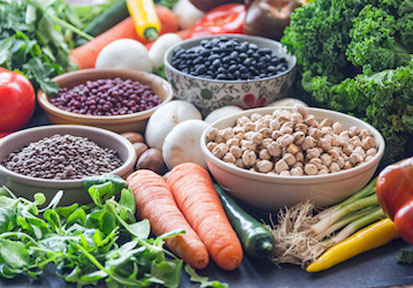There are many reasons why you might try or follow a vegetarian or plant-based eating plan—for health, religious, or ethical reasons—or because you’re simply curious about eating less meat. A well-planned vegetarian diet with a variety of whole foods can give you the right nutrients to support your health and performance.
Common terms defined
There are different types of vegetarian eating patterns—and different terms used to describe them—based on the types of foods they include.
- Vegan: Doesn’t include any ingredients from animals.
- Vegetarian: Doesn’t include meat, poultry, or fish, but might contain dairy, eggs, or honey.
Note: “Lacto-ovo” vegetarians eat egg and dairy products, and “pesco” vegetarians eat seafood. - Plant-based: Often used to refer to vegans or vegetarians, but also refers to ingredients and foods themselves, such as fruits, vegetables, whole grains, beans, legumes, soy foods, nuts and seeds, plant oils, and herbs and spices.
- Plant-forward: Emphasizes but not limited to plant-based foods. There are different variations of plant-forward eating patterns. Some include certain animal foods (such as meat, poultry, fish, dairy, or eggs), while others avoid them altogether.
- Flexitarian: Includes some animal foods on occasion, but is more focused on plant-sourced foods.
Benefits of vegetarian diets
Vegetarian eating patterns are often high in nutrients, including vitamins, minerals, fiber, protein, healthy fats, and phytonutrients. As a result, these diets are linked to a lower risk of many chronic diseases, including heart disease, diabetes, and cancer. Vegetarians tend to weigh less than nonvegetarians too.
The same nutrients in plant foods that support overall health also support athletic performance, making vegetarian diets increasingly popular among athletes. Rich in carbohydrates, protein, and phytochemicals, plant foods provide fuel for your workout and support recovery.
The key to success with a vegetarian diet is to focus on eating a variety of whole foods to optimize nutrients.
It’s also helpful to try to limit refined grains, sweets, and highly processed foods, which are lower in nutrients and might even prevent you from reaching your health and performance goals.
Nutrient goals
Vegetarian diets that include a variety of whole foods can be enough to meet your nutritional needs. But depending on the specific animal foods you avoid, you could fall short on getting a few key nutrients if you’re not careful with meal planning.
Strive to include these key nutrients (the examples here are plant-based):
- Protein (helps build and repair tissues and supports immune function): beans, peas, soy products, lentils, nuts
- Omega-3 fatty acids (help decrease inflammation and keep blood vessels healthy): walnuts, chia seeds, flax seeds, soybeans
- Iron* (supports red blood cell function and oxygen delivery to cells): beans, peas, lentils, leafy greens, nuts, seeds, whole grains, fortified breads and cereals
*To improve iron absorption from plant foods, eat it with foods high in vitamin C such as citrus fruits, tomatoes, or bell peppers.
- Zinc (supports immune function): beans, peas, lentils, soy products, nuts, seeds, whole grains
- Calcium (important for bone and muscle health): fortified plant milk (almond, soy, oat), tofu, leafy greens (collards, turnip, kale), bok choy, almonds
- Vitamin D (supports bone and health, muscle function, immune health): fortified plant milk, fortified cereals, mushrooms exposed to UV light
- Riboflavin (plays a role in energy metabolism): nutritional yeast, quinoa, fortified cereals, avocados, mushrooms
- Vitamin B12 (important for healthy red blood cells): nutritional yeast, fortified plant milk
- Iodine (needed for proper thyroid function): iodized salt, seaweed
Vegetarian diets for Service Members
Training, deployments, and day-to-day military life can sometimes make it challenging to follow a nutrient-rich vegetarian diet. Fortunately, military dining venues now offer more vegetarian options. These menu items might not always be labeled as vegan or vegetarian, so ask your local military dining venue which options are available. Programs such as Go for Green can help guide your choices. Vegetarian MREs are also available during training and deployments.
Additional resources
For more information on vegetarian diets, visit the Vegetarian Resource Group or the USDA’s resources on vegetarian nutrition. These plant-forward eating ideas offer tips on how you can fuel your day with more plant foods. A Registered Dietitian can also help you design a vegetarian or plant-forward eating plan to meet your individual nutrition needs.





